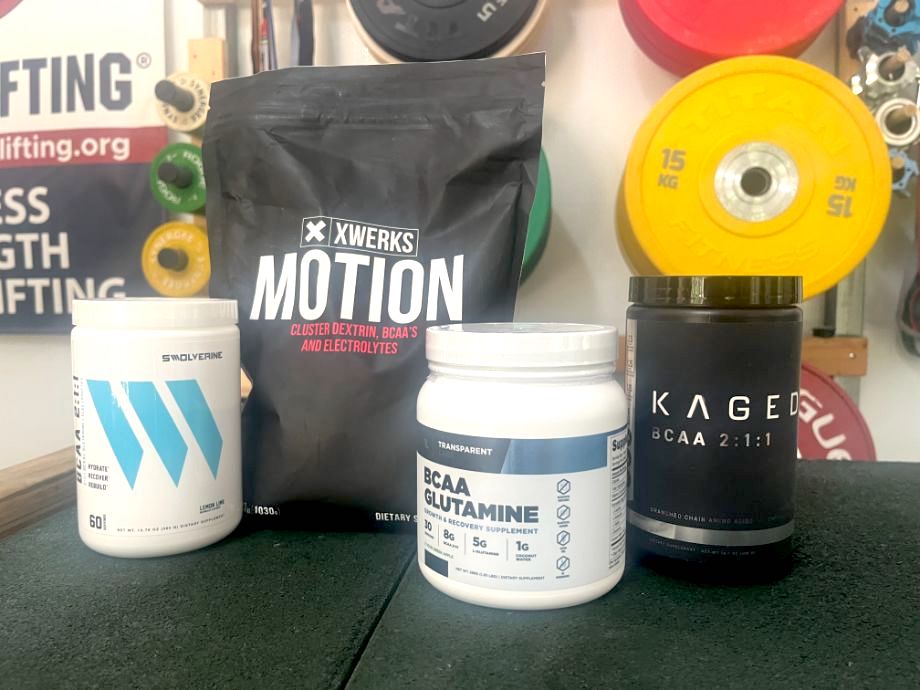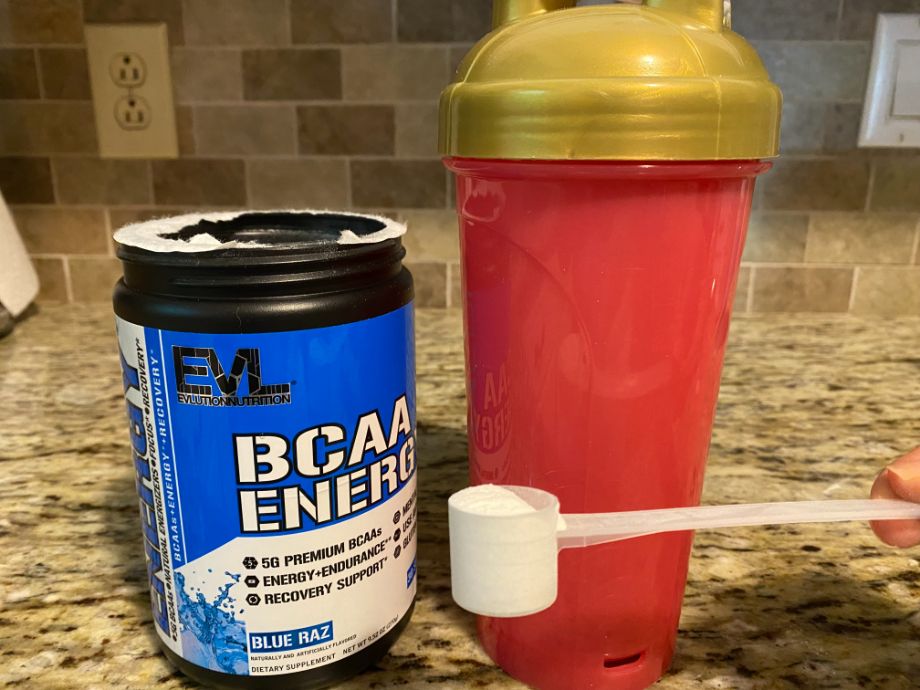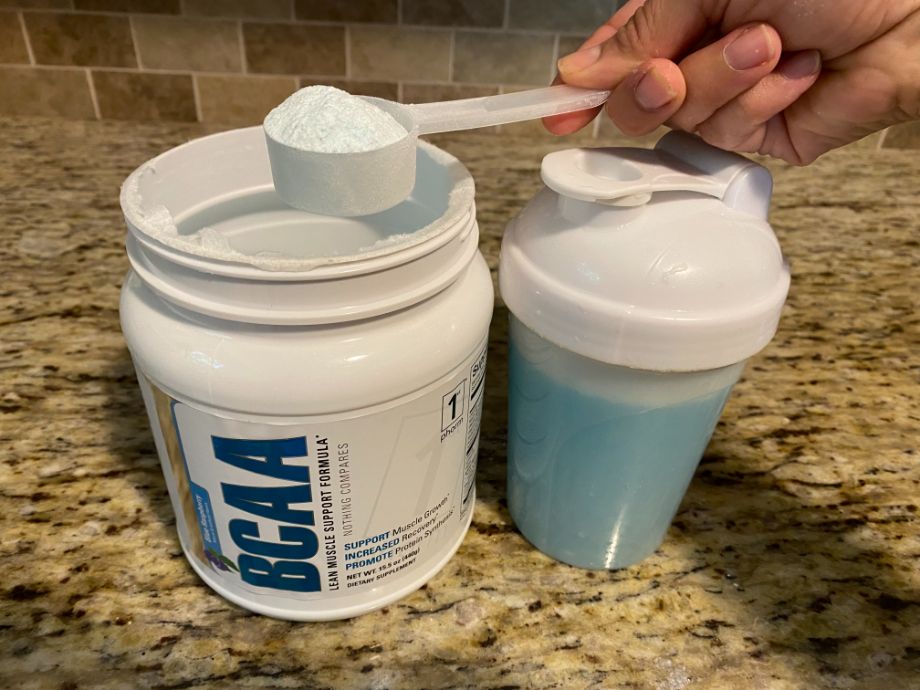We test and review fitness products based on an independent, multi-point methodology. If you use our links to purchase something, we may earn a commission. Read our disclosures.
Branched-chain amino acids (BCAAs) have stirred quite a debate in the fitness community. While some bodybuilders vouch for their effectiveness, others remain skeptical about the hype surrounding them. With such a divide, it’s challenging not to question the efficacy of even the best BCAA supplements on the market. Let’s cut through the confusion by addressing one pressing question: Are BCAAs worth it?
As a registered dietitian nutritionist with extensive experience evaluating nutritional supplements and examining evidence-based research, I bring my expertise to guide you in deciding whether BCAAs deserve a spot in your supplement stack. Spoiler alert: BCAAs can be worth it. In this article, we’ll uncover the benefits of BCAAs and identify individuals who stand to gain the most from their use.
Medical disclaimer: This article is intended for educational and informational purposes only. It is not intended as a substitute for medical advice. For health advice, contact a licensed healthcare provider.
What Are Branched Chain Amino Acids?
You might have heard that amino acids are the building blocks of protein. When you eat and digest protein, your body breaks it down into amino acids, all of which have unique responsibilities throughout the body.
BCAAs are a group of three essential amino acids (EAAs)—leucine, isoleucine, and valine—with a unique molecular structure. You must consume essential amino acids (including BCAAs) in your diet because your body doesn’t synthesize them.
RELATED: EAA vs BCAA
While all essential amino acids are important, BCAAs could play a particularly important role in protein synthesis, muscle growth, muscle recovery, and preventing loss of lean mass. Leucine, what I consider the king of the BCAAs, triggers a signaling pathway called mTOR, which is important for muscle hypertrophy and inducing an anabolic state.

BCAAs are in foods rich in high-quality protein, like fish, eggs, meat, poultry, and soy. Including these foods in your diet, especially when combined with resistance training, may support muscle growth and reduce muscle breakdown. Supplements like whey protein offer an alternative way to increase BCAA intake.
RELATED: High-Protein Foods for Muscle Building
Benefits of BCAAs, According to Research
The research on BCAAs is not definitive. However, some studies suggest potential BCAA benefits that could entice you to add them to your supplement stack.
Boosts Muscle Growth
In a study1 involving 10 resistance-trained men, those who ingested 5.6 grams of BCAAs post-training experienced a 22% higher muscle protein synthesis compared to a placebo group. These results may be largely due to leucine, the BCAA that stimulates muscle protein synthesis, which is needed to grow muscle2.
While this indicates that BCAAs alone may increase the stimulation of muscle protein synthesis following resistance training, other research3 suggests the effects of BCAAs on hypertrophy are limited in those already meeting adequate protein needs.
RELATED: How Much Protein to Gain Muscle?
Reduces Muscle Soreness
A study published in The Journal of Sports Medicine and Physical Fitness4, discovered that long-distance runners who ingested BCAAs after rigorous training experienced a 12% reduction in muscle soreness and fatigue compared to those who received a placebo. Additionally, markers of muscle damage and inflammation were notably lower in the group using BCAAs.
Even more, a 2021 review5 of 10 randomized clinical trials found that seven of these studies resulted in reduced DOMS 24 to 72 hours post-workout in those taking BCAAs. Variations in training status, doses, and timing make it difficult to draw definitive conclusions, but the research implies that supplementing with BCAAs enhances muscle recovery, reduces muscle breakdown, and eases soreness after a workout.

Supports Athletic Performance
Studies6 indicate that BCAAs decrease the influx of tryptophan that enters the brain. This is due to the competition between tryptophan and BCAAs for the same transport system to cross the blood-brain barrier. Tryptophan is utilized by the body to produce serotonin, a neurotransmitter that may contribute to muscle fatigue during endurance training.
With reduced tryptophan available for serotonin production, there is a potential for an extended feeling of energy and increased time to fatigue. However, it’s important to note that these findings are controversial, and further research is needed for a more conclusive understanding.
RELATED: Do BCAAs Give You Energy?
If you engage in prolonged exercise, delayed fatigue could enhance athletic performance by allowing you to exercise for longer without fatigue. As of now, there is no evidence supporting the idea that BCAAs can enhance performance in strength training.
Preserves Lean Mass During Weight Loss
One study7 involving 17 male athletes found that those who participated in resistance training and took BCAAs retained lean muscle mass while concurrently reducing fat mass. In contrast, the placebo group, who consumed a carbohydrate drink alongside resistance training, witnessed both fat and muscle loss. BCAAs could support changes in body composition for those wanting to lean out without losing muscle.
RELATED: Best BCAA for Men
Another nine-day study8 concluded that competitive wrestlers following a high-protein, calorie-restricted diet along with BCAA supplementation lost approximately 3.5 pounds more than their counterparts who received a soy protein supplement. Furthermore, the BCAA group demonstrated a 0.6% greater decrease in body fat compared to the soy protein group, despite both groups maintaining a similar daily calorie intake.
How to Get More BCAAs
To increase your intake of BCAAs, consider consuming more high-protein foods or a BCAA supplement.
Eat Foods Rich in BCAAs
Gym-goers wanting to build muscle need about 1.2 to 2.0 grams of protein per kilogram of body weight daily. Eating enough protein is a great way to ensure you’re consuming essential BCAAs.
BCAAs are abundant in both animal and plant-based protein sources. Animal proteins, like chicken, turkey, beef, fish, pork, and eggs, are complete proteins, meaning they include all nine essential amino acids, including BCAAs. Leucine is more abundant in animal proteins and is especially high in chicken, venison, ham, beef, and salmon.

Plant proteins typically lack at least one essential amino acid and may not include all BCAAs. Nevertheless, those following a vegan or vegetarian diet can ensure sufficient BCAAs by incorporating a diverse range of plant-based protein sources into their meals. Including quinoa, beans, lentils, tofu, and nuts in your diet is an excellent way to guarantee the intake of all BCAAs.
RELATED: How to Get More Protein
Take BCAA Supplements
As a dietitian, I always encourage whole food sources first, but if you struggle to consume enough daily protein, you may want to consider a BCAA supplement. Several workout supplements contain BCAAs, so it’s important to understand the key differences between each type of product.
Protein powders for building muscle that contain a complete amino acid profile will help you increase your BCAA and protein intake simultaneously. Consider whey, casein, or soy protein powders to ensure you’re getting adequate amounts of all BCAAs.
Considering pre-workouts with BCAAs is an alternative if you aim to enhance energy, focus, and BCAA intake. Nonetheless, it’s crucial to note that optimal results from BCAAs are achieved when taken in conjunction with all essential amino acids.
You may prefer a creatine supplement with BCAAs, like Six Star Creatine X3, if your primary goal is enhancing strength, power, and muscle growth. Creatine monohydrate is one of the most studied supplements on the market and is highly sought after for its evidence-backed benefits.

Finally, you can opt to take a stand-alone BCAA supplement. While you may experience the potential benefits mentioned previously, it’s important to emphasize that the impact of your results will be significantly influenced by the quality of your training and nutrition, rather than solely relying on a BCAA supplement.
Potential Side Effects of BCAAs
In appropriate amounts, BCAAs are generally regarded as safe. It’s advised to read and adhere to the recommended dosage instructions provided on the product label. That said, BCAAs may need to be avoided by individuals with specific medical conditions or those taking particular medications.
In particular, people with liver or kidney disease may need to steer clear of BCAA supplements, as these products could elevate toxic waste products in the blood, putting additional strain on compromised organs. Furthermore, interactions with medications for diabetes and neurological disorders may pose risks.
If you have an existing medical condition or prescribed medications, consult with your healthcare provider or sports nutrition dietitian before starting a new supplement.
Are BCAAs Worth It? FAQs
Do BCAAs really make a difference?
BCAAs offer potential advantages such as muscle-building, performance enhancement, and post-exercise recovery. However, the most evidence-backed benefit appears to be in the realm of post-exercise recovery.
What is the downside of BCAAs?
Branched-chain amino acid supplements are generally safe for the majority of people, yet individuals with existing medical conditions or those on prescribed medications may need to avoid them. Consult with your doctor before incorporating any new supplements into your regimen.
Are BCAAs necessary for building muscle?
While certain studies suggest that BCAA supplements might boost muscle gains, the overall research remains inconclusive. Overall, a BCAA supplement isn’t essential for muscle building. Emphasizing a well-structured training regimen and maintaining a balanced, high-protein diet is most crucial for muscle growth.
These statements have not been evaluated by the Food and Drug Administration. This product is not intended to diagnose, treat, cure, or prevent any diseases.
References
- Jackman SR, Witard OC, Philp A, Wallis GA, Baar K, Tipton KD. Branched-Chain Amino Acid Ingestion Stimulates Muscle Myofibrillar Protein Synthesis following Resistance Exercise in Humans. Front Physiol. 2017 Jun 7;8:390. doi: 10.3389/fphys.2017.00390. PMID: 28638350; PMCID: PMC5461297.
- Duan Y, Li F, Li Y, Tang Y, Kong X, Feng Z, Anthony TG, Watford M, Hou Y, Wu G, Yin Y. The role of leucine and its metabolites in protein and energy metabolism. Amino Acids. 2016 Jan;48(1):41-51. doi: 10.1007/s00726-015-2067-1. Epub 2015 Aug 9. PMID: 26255285.
- Plotkin, D. L., Delcastillo, K., Van Every, D. W., Tipton, K. D., Aragon, A. A., & Schoenfeld, B. J. (2021). Isolated Leucine and Branched-Chain Amino Acid Supplementation for Enhancing Muscular Strength and Hypertrophy: A Narrative Review. International Journal of Sport Nutrition and Exercise Metabolism, 31(3), 292-301. Retrieved Nov 16, 2023, from https://doi.org/10.1123/ijsnem.2020-0356
- Matsumoto K, Koba T, Hamada K, Sakurai M, Higuchi T, Miyata H. Branched-chain amino acid supplementation attenuates muscle soreness, muscle damage and inflammation during an intensive training program. J Sports Med Phys Fitness. 2009;49(4):424-431.
- Weber MG, Dias SS, de Angelis TR, et al. The use of BCAA to decrease delayed-onset muscle soreness after a single bout of exercise: a systematic review and meta-analysis. Amino Acids. 2021;53(11):1663-1678. doi:10.1007/s00726-021-03089-2.
- Cordeiro LMS, Rabelo PCR, Moraes MM, et al. Physical exercise-induced fatigue: the role of serotonergic and dopaminergic systems. Braz J Med Biol Res. 2017;50(12):e6432. Published 2017 Oct 19. doi:10.1590/1414-431X20176432
- Dudgeon WD, Kelley EP, Scheett TP. In a single-blind, matched group design: branched-chain amino acid supplementation and resistance training maintains lean body mass during a caloric restricted diet. J Int Soc Sports Nutr. 2016;13:1. Published 2016 Jan 5. doi:10.1186/s12970-015-0112-9
- Mourier A, Bigard AX, de Kerviler E, Roger B, Legrand H, Guezennec CY. Combined effects of caloric restriction and branched-chain amino acid supplementation on body composition and exercise performance in elite wrestlers. Int J Sports Med. 1997;18(1):47-55. doi:10.1055/s-2007-972594
Further reading

Learn about our hands-on experience with these budget-friendly, durable resistance bands in our Living.Fit Resistance Bands review. Read more

Looking to kick your fitness goals into overdrive in the New Year? Find the best New Year's fitness sales from top brands across the industry, including NordicTrack, REP, Sole, and Tonal. Read more

Rob Gronkowski and his brothers have a fitness equipment line? We’ll see how the equipment stacks up in this Gronk Fitness Functional Trainer review. Read more

A fitness expert explains how a strong boxing stance can help deliver fast and powerful punches, provide balance and mobility, and help you feel more confident. Read more

